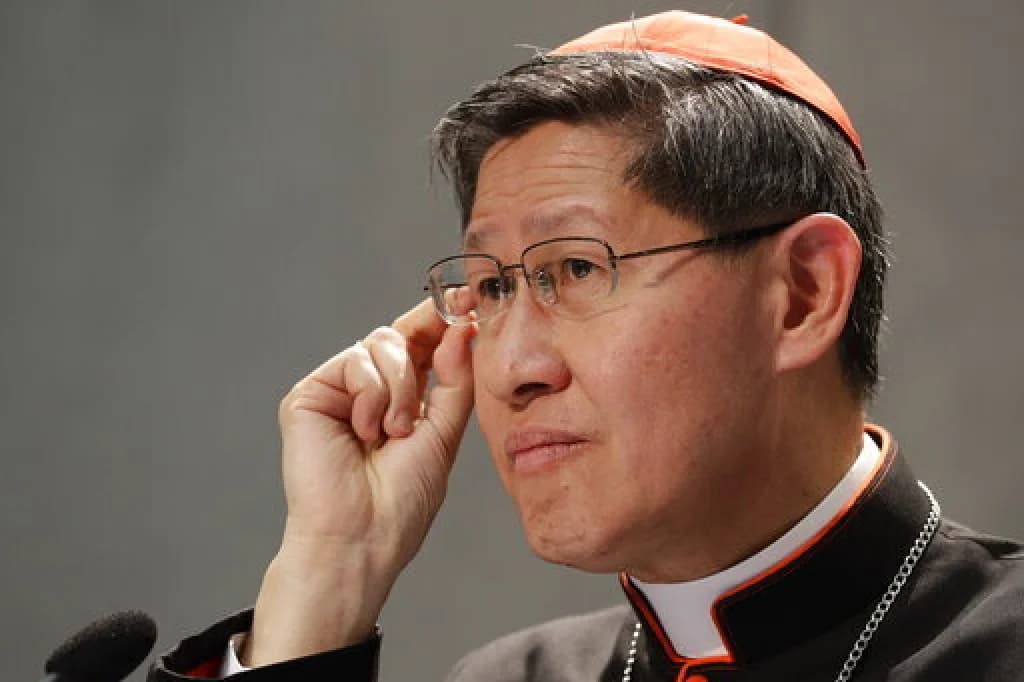MANILA, Philippines – Cardinal Luis Antonio Tagle, the high-ranking prelate frequently touted as a papabile in the recent election, who just this weekend took possession of his titular diocese of Albano, Italy — one of the suburbicarian sees, so-called because they are dioceses within the province of Rome traditionally assigned to a Cardinal Bishop — and holds a senior leadership role in the Dicastery for Evangelization, has kept his finger on the pulse of his home country, the Philippines.
Over the course of several weeks between September and October, Tagle rebuked corrupt Filipino politicians who “pretend to be God” as they plunder the country’s wealth in a billion-peso corruption scandal.
“My message is this: Please, you are human beings. You are created in God’s image. Can you please look at yourself and, with humility, say, ‘I am not God. I should not pretend to be God. I am a creature with many other creatures, and so my responsibility is to take care of what God has given to us for the good of all,” Tagle said in a recent interview with the ABS-CBN News Channel.
It was one of Tagle’s sharpest comments on Philippine politics ever since the former Manila archbishop moved to the Vatican in 2019. The televised remarks of Tagle, who often shies away from interviews with local journalists, illustrate the gravity of the problem besetting his home country.
The current corruption scandal involves the plunder of billions of pesos in flood control projects, which has triggered congressional investigations and prompted the country’s biggest Church-backed protests in over a decade.
Tagle, 68, said his first reaction to the flood control scandal was “unbelief.”
“Could this be true?” Tagle said in the ABS-CBN interview that was uploaded to YouTube on October 4. “Could brothers and sisters do this to other brothers and sisters?” he asked. “Then, the reality sets in: Yes, it is possible. So as a spiritual leader, we somehow get in touch with this mystery — the mystery of the capacity of human beings to destroy each other through corruption.”
Tagle, one of Asia’s most respected theologians, sought to make sense of the corruption scandal through the lens of faith.
“This is the thing that disturbs us, especially leaders of the Church: Is there still a sense of humanity? Is there still a sense of sin? Because if you lose your sense of humanity, then you would also lose your sense of sin. Because if you don’t see in your brother or sister a gift of God, then what will prevent you from hurting them?” the Filipino cardinal said.
It was timely, he said, that the corruption exposés and public protests took place during the Season of Creation, a five-week period from September 1 to October 4, celebrating the gift of God’s creation.
“The Season of Creation reminds everyone: We are stewards. No one should pretend to be the owner and the lord of everything,” Tagle said. “Being a steward brings with it that sense of responsibility and accountability to the real owner — and that is God, who willed that the goods of the earth should be shared by all.”
When asked about the Church’s own shortcomings, given that many of the corrupt officials came from Catholic schools, Tagle attributed it “partly” to the Church’s failure in forming good Catholics.
“But we also have to realize that the Church is not the only influence on the lives and minds of people,” he said, citing the influence of social media as well as cultural and philosophical trends.
He emphasized the role of the family, as the domestic church, to teach their children good values, and “not to pass on the responsibility of Christian formation only to the catechist and the parish priest.”
Tagle also said Filipinos should go beyond massive protests.
The Philippine Catholic Church had supported a September 21 rally called the Trillion Peso March, drawing tens of thousands to the country’s streets. Bigger protests are expected on November 30, a public holiday in honor of the 19th-century Filipino hero Andres Bonifacio.
“After the rallies, we should now look for a lasting change because we cannot effect change simply by expressing our anger. On a day-to-day basis, the changes should be made by persons and institutions,” Tagle said.
While the protests “must continue,” Tagle said, he also called on Filipinos to “be creative in different ways of protesting.” He cited a time when boycotting certain products, for example, was a form of protest.
He then appealed to Filipino leaders in general: “To the people in government, you have been elected by our people in good faith. We give that benefit in good faith. Now, part of your stewardship is to show that you are good caretakers of the wealth of the nation and also the future of our people.”















